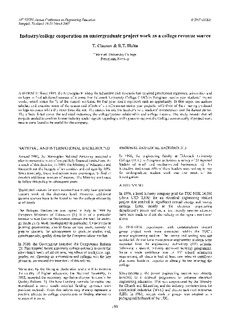| dc.description.abstract | Since 1994, the Norwegian Ministry for Education and Research has required government supported universities and colleges to find additional sources of income. For Telemark University College (TUC) in Porsgrunn, senior year students' project works, which count for 1/6 of the student workload for that year, could represent such an opportunity. In this paper, the authors tabulate and examine some of the causes and effects of six off-campus senior year projects, with three of them having produced college revenues while the other three did not. The causes include the teacher' s role, students' competences and the human factor. The effects listed cover the technical outcomes, the college/partner relationship and college income. The study reveals that all projects tended to confirm former industry leader signals regarding a willingness to support the College economically if project work results were found to be useful for the company. | |
